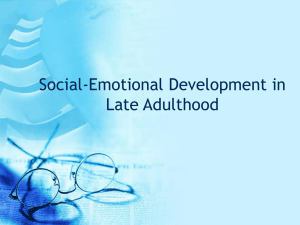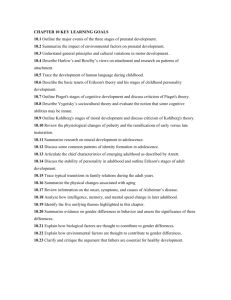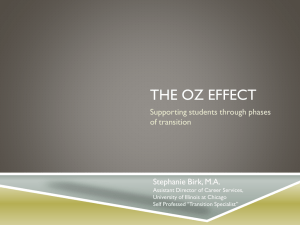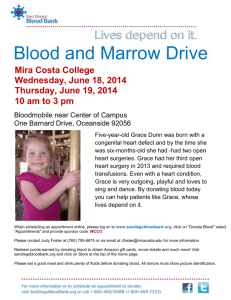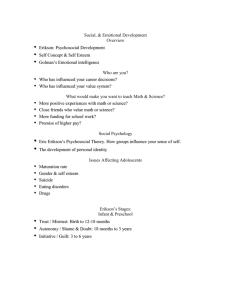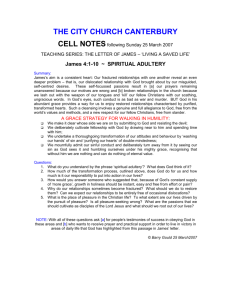Autonomism – “a law unto myself”
advertisement
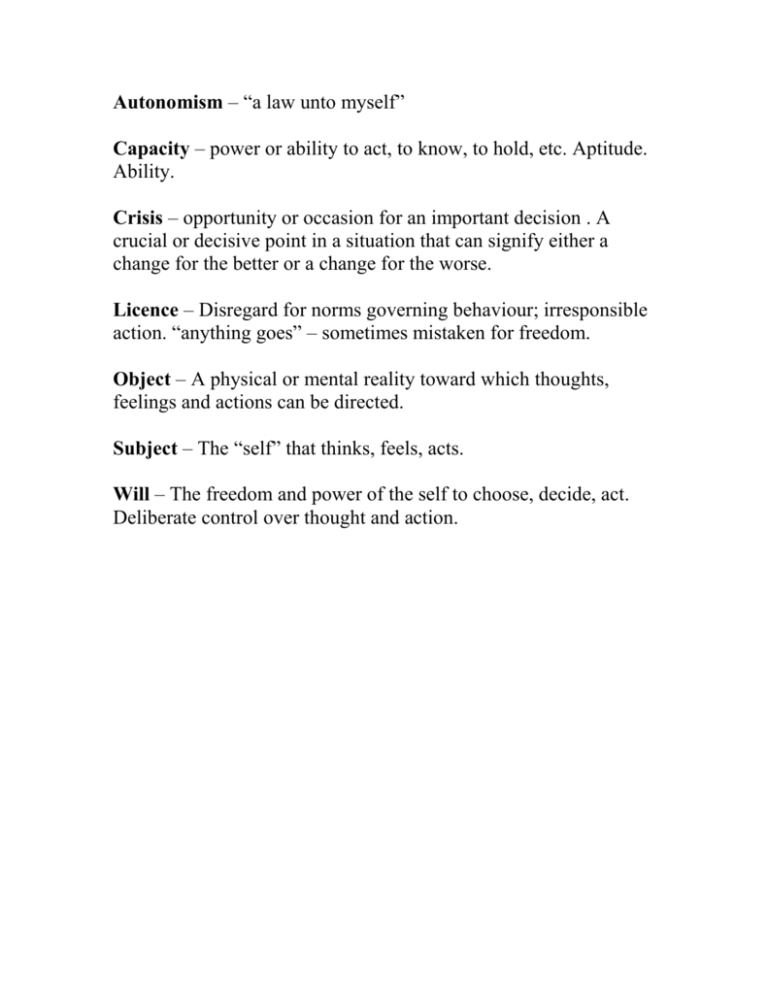
Autonomism – “a law unto myself” Capacity – power or ability to act, to know, to hold, etc. Aptitude. Ability. Crisis – opportunity or occasion for an important decision . A crucial or decisive point in a situation that can signify either a change for the better or a change for the worse. Licence – Disregard for norms governing behaviour; irresponsible action. “anything goes” – sometimes mistaken for freedom. Object – A physical or mental reality toward which thoughts, feelings and actions can be directed. Subject – The “self” that thinks, feels, acts. Will – The freedom and power of the self to choose, decide, act. Deliberate control over thought and action. Freedom - 1730 God created man a rational being, conferring on him the dignity of a person who can initiate and control his own actions. "God willed that man should be 'left in the hand of his own counsel,' so that he might of his own accord seek his Creator and freely attain his full and blessed perfection by cleaving to him."26 1731 Freedom is the power, rooted in reason and will, to act or not to act, to do this or that, and so to perform deliberate actions on one's own responsibility. By free will one shapes one's own life. Human freedom is a force for growth and maturity in truth and goodness; it attains its perfection when directed toward God, our beatitude. 1732 As long as freedom has not bound itself definitively to its ultimate good which is God, there is the possibility of choosing between good and evil, and thus of growing in perfection or of failing and sinning. This freedom characterizes properly human acts. It is the basis of praise or blame, merit or reproach. 1733 The more one does what is good, the freer one becomes. There is no true freedom except in the service of what is good and just. The choice to disobey and do evil is an abuse of freedom and leads to "the slavery of sin."28 1734 Freedom makes man responsible for his acts to the extent that they are voluntary. Progress in virtue, knowledge of the good, and ascesis enhance the mastery of the will over its acts. 1738 Freedom is exercised in relationships between human beings. Every human person, created in the image of God, has the natural right to be recognized as a free and responsible being. All owe to each other this duty of respect. The right to the exercise of freedom, especially in moral and religious matters, is an inalienable requirement of the dignity of the human person. This right must be recognized and protected by civil authority within the limits of the common good and public order.32 (Catechism of the Catholic Church) Erik Erikson’s Stages of development Infant Stages 1) Basic Trust vs. Mistrust (Birth to 18 months) In infancy, children begin to explore the world and may feel a sense of fear or mistrust. When caregivers are responsive and attend to a child's needs, the infant learns the world is a good and pleasant place and is willing to explore the world around him/her. In contrast, if the child's needs are left unmet by the caregiver, the child may feel unprotected and withdraw from the world. Early Childhood Stage 2) Autonomy vs. Shame and Doubt (18 months to 3 years) During the toddler years, Erikson believed children begin to assert their independence and develop autonomy or the ability to do things independently. If a child encounters too much restraint or harsh punishment during this stage, Erikson believed the child would experience shame. Childhood Stages 3) Initiative vs. Guilt (3 to 5 years, preschool years) According to Erikson, this is when children begin to understand morality and the idea of right and wrong. At this stage, children are expected to assume responsibility for their behavior and to take on new tasks. If children take the initiative and are supported and encouraged, then they will successfully complete the stage. If children are made to feel anxious, it will result in feelings of guilt. 4) Industry vs. Inferiority (6 years to puberty, the elementary school years) The elementary school years are the years when a child learns to master tasks (e.g., the ABC's, math problems) and to develop social skills. More importantly, this is the time in development when adults besides one's parents, such as teachers, coaches, etc. are beginning to influence development. If a child experiences repeated failures, Erikson believed they would develop an inferiority complex and remain in this stage. Adolescent Stage 5) Identify vs. Identity Confusion (puberty to young adulthood) This is the stage that takes place during adolescence, a time of rapid physical and emotional growth, where changes in appearance that make you look more like an adult may change the way you are treated. This is the stage when one engages in identity exploration and determines the type of adult s/he would like to become in the future. If the conflicts of early stages have not been satisfactorily resolved, then the adolescent may find herself in state of role confusion, where she is unprepared to face the psychological challenges of adulthood. Early Adulthood Stage 6) Intimacy vs. Isolation (young adulthood) During this stage, Erikson believed a person formed an intimate romantic relationship and made a commitment to a romantic partner. For Erikson, intimacy was finding and losing oneself in another person and developing a "couple identity." Researchers now consider this stage to be a time where people form intimate, meaningful relationships with friends as well as with romantic partners. Midlife Stage 7) Generativity vs. Stagnation (middle adulthood) For Erikson, this stage involved having children, raising a family, and giving of oneself to the next generation. Today, we recognize there are many other ways to be generative besides having children. For example, teachers, politicians, volunteers, scientists, and philanthropists can all be generative by influencing others, generating ideas, and benefiting others. Late Life Stage 8) Integrity vs. Despair (older adulthood) In late life, Erikson believed it was necessary to look back on your life, try to make sense of it all, and determine if you accept your life or if you feel regret or disappointment. If you gain acceptance then you have achieved integrity, whereas if you feel regret you could be trapped in despair. (Source: https://courses.worldcampus.psu.edu/welcome/hdfs129/print.html) Capitalism – An economic system based on private or corporate ownership and control of resources and means of production and distribution. Goods and services are exchanged in a free market. Commodity – something that carries an economic value within the marketplace; something that can be bought, sold and traded. Consumerism – A world view whereby one attributes meaningfulness to life through one’s capacity and ability to purchase and consume economic goods. Democracy – government by the will of all the people, a will that is expressed directly or through freely elected representation. To protect all people within the society from tyranny of the majority, democracies must recognize and guarantee the rights of the minority. A democracy that is ruled strictly by majority without protecting the rights of the minority would quickly degenerate into a system of class or privilege that no longer reflects the will of the governed. Individualism – A world view that favours the free action of individuals within society; a philosophical stance that began to develop in the seventeenth century with the thinking of Descartes, Hobbes, Locke, that places persona rights and freedoms above other considerations. It is a social theory that favours personal autonomy. Instrumental Reason – human ability to select and develop effective means for achieving desired ends; ability to develop technologies. Liberalism – a philosophy based on the goodness of the human being, autonomy of the individual, and standing for the protection of economic, political and civil rights and freedoms. Market – where buyers and sellers meet to exchange, sell trade goods. The value of goods is determined in the market, largely as a factor of supply and demand. However the market is rarely allowed to function in an entirely free manner when one takes into consideration government restrictions, duties and tariffs, collusion among suppliers to limit supply in order to drive up the price, fierce advertising practices and so on. Private property – something that is owned for one’s exclusive use, or for one’s exclusive control. Relativism – a doctrine that knowledge is not absolute, but is conditioned by relation to another. Everything stands in relationship to everything else, and is judged based on these relationships rather than on any absolute principle or truth. Social Contract – a term used by philosophers to describe the tacit agreement or individuals to live in community. It is a means of discussing the hypothetical terms the conditions that govern human society. Utilitarianism: A philosophy or world view that measures the value of all things according to the principle of usefulness – that which provides for the greatest pleasure or well being for the greatest number. Conversion – a radical transformation of the person, a turning around. At the intellectual level, it takes place as an awareness and openness to truth and true knowing. At the moral level, it takes place when I recognize myself as free and responsible. At the religious level, it takes place where my pre-occupation with myself is taken over with the love of God and love for others. Grace – the gift of God’s life and love at the centre of our existence through the indwelling of the Holy Spirit. Christ is the source of our life, through whom we become free and capable to love. 1996 Our justification comes from the grace of God. Grace is favor, the free and undeserved help that God gives us to respond to his call to become children of God, adoptive sons, partakers of the divine nature and of eternal life.46 1997 Grace is a participation in the life of God. It introduces us into the intimacy of Trinitarian life: by Baptism the Christian participates in the grace of Christ, the Head of his Body. As an "adopted son" he can henceforth call God "Father," in union with the only Son. He receives the life of the Spirit who breathes charity into him and who forms the Church. 1998 This vocation to eternal life is supernatural. It depends entirely on God's gratuitous initiative, for he alone can reveal and give himself. It surpasses the power of human intellect and will, as that of every other creature.47 1999 The grace of Christ is the gratuitous gift that God makes to us of his own life, infused by the Holy Spirit into our soul to heal it of sin and to sanctify it. It is the sanctifying or deifying grace received in Baptism. It is in us the source of the work of sanctification:48 2003 Grace is first and foremost the gift of the Spirit who justifies and sanctifies us. But grace also includes the gifts that the Spirit grants us to associate us with his work, to enable us to collaborate in the salvation of others and in the growth of the Body of Christ, the Church. There are sacramental graces, gifts proper to the different sacraments. There are furthermore special graces, also called charisms after the Greek term used by St. Paul and meaning "favor," "gratuitous gift," "benefit."53 Whatever their character sometimes it is extraordinary, such as the gift of miracles or of tongues - charisms are oriented toward sanctifying grace and are intended for the common good of the Church. They are at the service of charity which builds up the Church.54 (Catechism of the Catholic Church) Legalism – literal interpretation of the law, and attitude that something is right because it is commanded to be so. Pelagianism – An erroneous teaching that proposed that our ultimate happiness is due to our own efforts and good works, and due to God’s graciousness. Righteousness – Our right relationship with each other and before God. Jesus revealed that we do not earn God’s love and eternal life by moral living. Rather, God gives us his life, love and everlasting happiness simply because God loves us. Moral living is our response to this free gift. Truth – Simply put, Jesus is the truth. Through the Holy Spirit, Jesus dwells within us. The grace of God moves us toward the truth and the truth sets us free. St. Augusine Rene Descartes Erik Erikson Lawrence Kohlberg Thomas Hobbes John Locke Jean-Jacques Rousseau John Rawls Charles Taylor St. Paul
